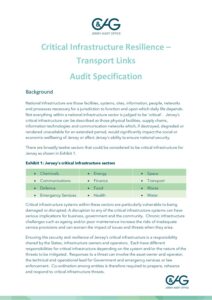
Tuesday 4 March 2025 - Project Specification
Tuesday 4 March 2025 - Project Specification
Topics: Risk Management
Departments: Transport & Technical Services
Sector: All

Project Specification: pdf (207.38 KB)
Download in full ↓National Infrastructure are those facilities, systems, sites, information, people, networks and processes necessary for a jurisdiction to function and upon which daily life depends. Not everything within a national infrastructure sector is judged to be ‘critical’.
Jersey’s critical infrastructure can be described as those physical facilities, supply chains, information technologies and communication networks which, if destroyed, degraded or rendered unavailable for an extended period, would significantly impact the social or economic wellbeing of Jersey or affect Jersey’s ability to ensure national security.
There are broadly twelve sectors that could be considered to be critical infrastructure for Jersey, which are:
Critical infrastructure systems within these sectors are particularly vulnerable to being damaged or disrupted. A disruption to any of the critical infrastructure systems can have serious implications for business, government and the community. Chronic infrastructure challenges such as ageing and/or poor maintenance increase the risks of inadequate service provisions and can worsen the impact of issues and threats when they arise.
Ensuring the security and resilience of Jersey’s critical infrastructure is a responsibility shared by the States, infrastructure owners and operators. Each have different responsibilities for critical infrastructure depending on the system and/or the nature of the threats to be mitigated. Responses to a threat can involve the asset owner and operator, the technical and operational lead for Government and emergency services or law enforcement.
Co-ordination among entities is therefore required to prepare, rehearse and respond to critical infrastructure threats.
Significant public funds can be spent responding to emergencies relating to critical infrastructure. It is important for Jersey to have in place an effective resilience framework supported by effective resilience plans and procedures across the States, asset owners and operators.
When the C&AG reported the first phase of her Critical Infrastructure Resilience audit in 2024, focussed on energy, Jersey was planning to introduce a new Civil Contingencies Law with a focus on resilience. This has since been paused.
The Jersey Resilience Forum (JRF) is a multi-agency organisation that brings together those who have a role to play in an emergency response from within and outside the Government. The JRF, through its Delivery Group, is seeking to work across its membership to ensure that appropriate plans are in place in each organisation in the event of an incident, and that these are shared with Government.
The resilience of transport infrastructure and connectivity is especially important in the Jersey context due to the need to use transport to ensure the supply and delivery of vital goods and services to Islanders and for enabling Islanders to access critical mainland services.
In 2024 and early 2025 the Government undertook significant tender exercises in respect of ferry links and bus services. In addition, over recent years the Government has provided support, through loans, to Blue Islands who are responsible for a number of air links to the Island.
This audit will evaluate whether the Government has an effective approach to ensuring the resilience of its transport infrastructure including ferry, bus and air links.
The first Phase of the audit, reported in 2024, focussed on the energy sector. This 2025 audit is focussed on transport links.
It will assess the resilience of the Island’s critical transport infrastructure, including air, ferry, bus and road networks.
It will audit arrangements for the provision of critical transport services including how supply chains are assured.
It will also follow up on overarching resilience actions that the Government committed to following Phase one.

Associate Member of EURORAI - a cooperation project between public sector supervisory bodies in Europe